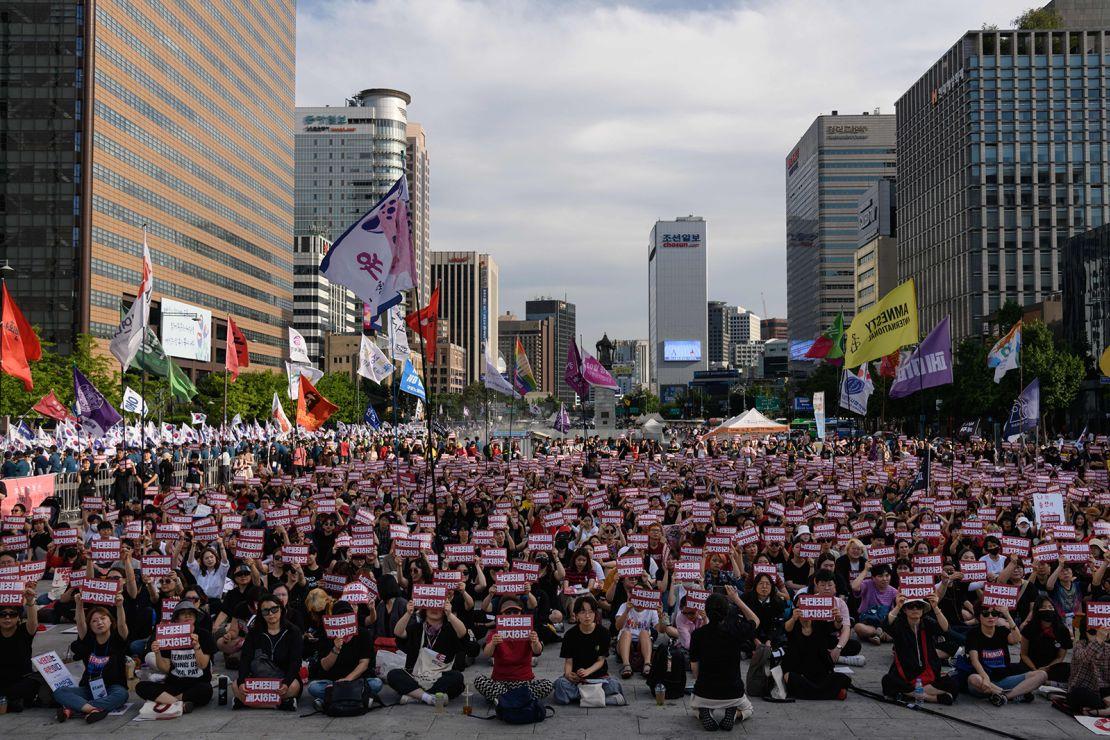
The placards read: “Abolish punishment for abortion”. (Seoul, 7 July 2018)
Seoul National Police began investigating her for murder in July this year at the request of the South Korean government, after she had posted a video on YouTube purportedly documenting her experience of getting an abortion, police told CNN.
However, there has been no law at all about abortion in South Korea since April 2019. This fact has again raised urgent questions about why the country has no abortion law and what to do about it, and about this case. The history goes back to 2019, when a restrictive abortion law was removed from the law books by the Constitutional Court, following successful campaigns by the women’s movement. Since then, in spite of regular campaigns by the groups to pass a good law, no new law has been drafted or debated, let alone passed ever since.
In a joint statement in response to the current investigation, a coalition of 11 South Korean women’s organizations and NGOs slammed the government for pursuing women who terminate pregnancies rather than improving access to abortion care. “This is nothing short of a pathetic and serious attempt to evade responsibility and shift blame,” the statement said.
By not passing abortion laws, the National Assembly is “not doing its job,” said Cho Hee-kyoung, a law professor at Hongik University in Seoul. “If there is no law criminalizing a conduct, then there is no crime for carrying out that conduct…. Between the 1960s and the mid-2000s, the South Korean government strongly emphasized family planning to curb population growth, to the point that abortion was seen as an “alternative method of birth control,” she said.
“Since the criminality of abortion was banned, we have been asking the health and welfare ministry to classify abortion as a health right, not as a subject of punishment, and to come up with policies,” said Na Young, a representative for SHARE, an organization in South Korea that provides services related to sexual and reproductive health and rights.
Instead, the authorities began cracking down on the procedure in the mid-2000s. Doctors began to be charged with performing abortions, prompting a court challenge that sought to safeguard the rights of women to seek an abortion and for doctors to provide them. Meanwhile, South Korea’s birth rate has been dropping and is now among the lowest in the world, so the government began seeking ways to boost the population, such as harassing those who provide and have abortions.
In the absence of clear regulations, women and abortion providers currently operate in a grey area with little guidance as to what is permitted and what might break other laws. Credible information about where to get an abortion is hard to come by, and the procedure is not covered under the country’s public health system. Often, women will rely on word of mouth to find a clinic that will perform an abortion, at a cost of hundreds of dollars that they must pay out of pocket, said Susanné Seong-eun Bergsten, an officer in the women’s rights division of Human Rights Watch.
Abortion pills are banned and the website of Women on Web has been blocked since 2019. Hence, pills are available mainly on the black market, and the number of abortions is unknown.
More history
You can read the history of the South Korean women’s movement’s campaigns to decriminalise abortion on the ICWRSA website at these links:
Six news reports in 2018-2019, at https://www.safeabortionwomensright.org/news/page/3/?search_text=South%20Korea&filtered
Four news reports in 2020 and 2021, at:
https://www.safeabortionwomensright.org/news/page/2/?search_text=South%20Korea&filtered
Five news reports in 2021, 2023 and 2024, at:
https://www.safeabortionwomensright.org/news/?search_text=South%20Korea&filtered
SOURCE for the current events: CNN, by Lex Harvey, Gawon Bae, 20 September 2024 +
PHOTO: Ed Jones/AFP/Getty Images/File



